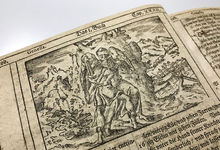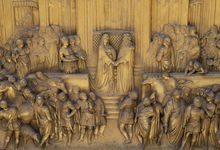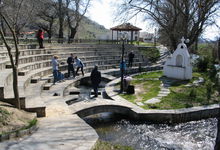The royal road to freedom
It is a harrowing tale with a happy ending—and that in a double sense. This is the story about a prison escape, followed by a midnight snack at the jailer’s house.

What? The two men who had been thrown into the deepest and darkest prison chamber in Philippi started to pray and sing hymns in the middle of the night. Although their feet had been fastened in stocks and they were still bleeding from being flogged, nothing could prevent them from praising God. Unbelievable!
The other inmates not only heard them, but were listening to them. In the Greek original of Acts 16 the term epakroáomai is used, which means “to listen intently”. So Paul and Silas became examples for these earwitnesses: not walls or chains make a true prison; those who are inwardly free are truly free.
Apostles in a supporting role
How did the two end up in prison? They had gotten in the way of someone who was earning a great deal of money by sending out a slave girl who had a spirit by which she predicted the future. Paul commanded the spirit to come out of her. The girl’s owners thereupon incited the mob and finally managed to bend the law in their favour.
How did Paul and Silas manage to escape? An earthquake shook the prison so that the chains fell off their feet and the doors of the prison sprang open. Actually, the story is not even about the freeing of Paul and Silas. Already four chapters before, we can read about a similar miracle: an angel helped Peter escape from prison. No, the point of the story in Philippi is not the freeing of the prisoners, but the freeing and saving of the Philippian jailer.
How can I get out of this mess?
“Sirs, what must I do to be saved?” the jailer asked Paul, who prevents the dutiful civil servant from killing himself with his own sword, following the alleged escape of the prisoners. “How can I get out of this mess?” is how an influential North American scholar on New Testament studies and a Pauline specialist interprets the Greek original.
This is not at all far-fetched: healing; bringing to safety; protecting from danger, harm, and attacks. All these notions are covered by the Greek term that the New King James Version translates with “saved”. And all of a sudden the events of that time are very close to the here and now.
“What must I do to escape my plight?” This is a question that all those ask themselves who are inwardly trapped by suffering and burdens: those who have suffered injustice and other hurts, as well as those who are weighed down by guilt. The sick ask themselves the same question, as do the poor, the distraught, and the lonely and the grieving.
Knowing what helps
The answer by Paul and Silas is short and to the point: “Believe on the Lord Jesus Christ, and you will be saved.” That’s all? At any rate, for the jailer it was enough. That same night, he and his family were baptised. He set up a midnight feast.
It is not as simple as it sounds. Belief is not only holding something to be true. Rather, belief is a convinced: “I trust, and I build on this trust.” But what exactly do we build on? On Jesus Christ, but not only on Him. In the Greek original it says kýrios: Lord and Master, the One who is strong, who can command, and is endowed with power and authority.
“I know that Jesus will help.” Those who can muster up such trust have already freed themselves from their inner prison. They can praise their God even if the outer walls are still in place. And sometimes such a strong belief can trigger an earthquake that changes things radically.
Photo: areebarbar - stock.adobe.com
Article info
Author:
Date:
Keywords:
Andreas Rother
25.06.2018
Bible Study
, Divine service,
Doctrinal instruction






















